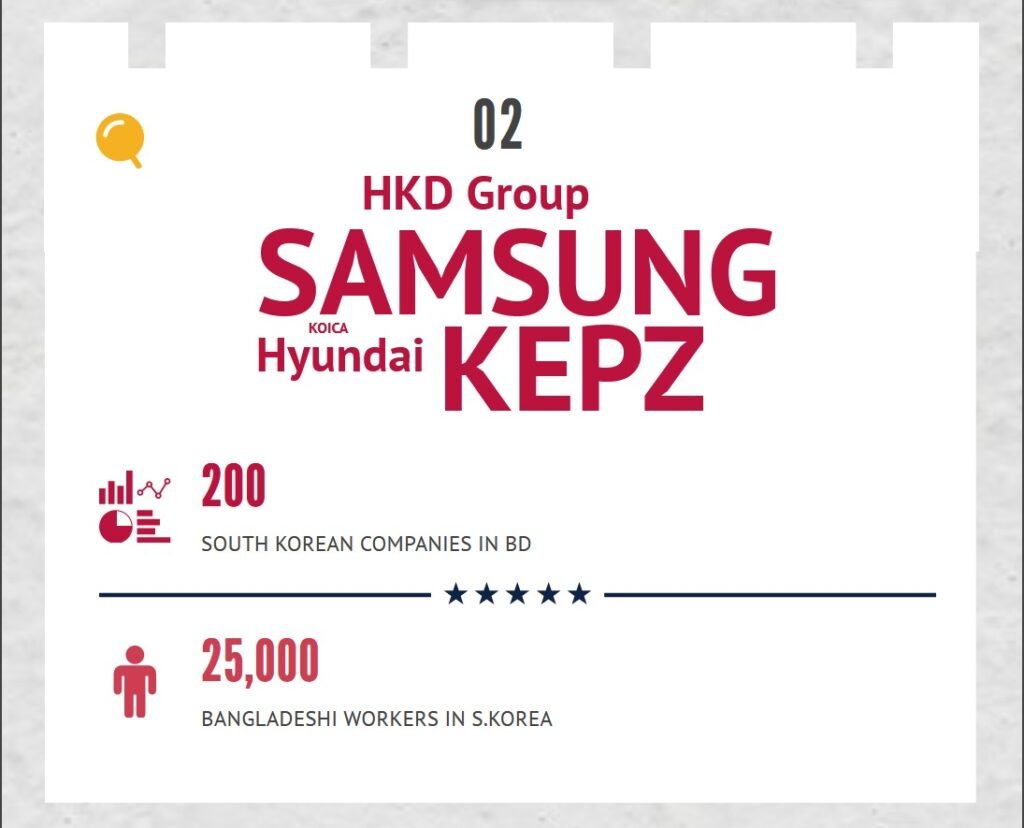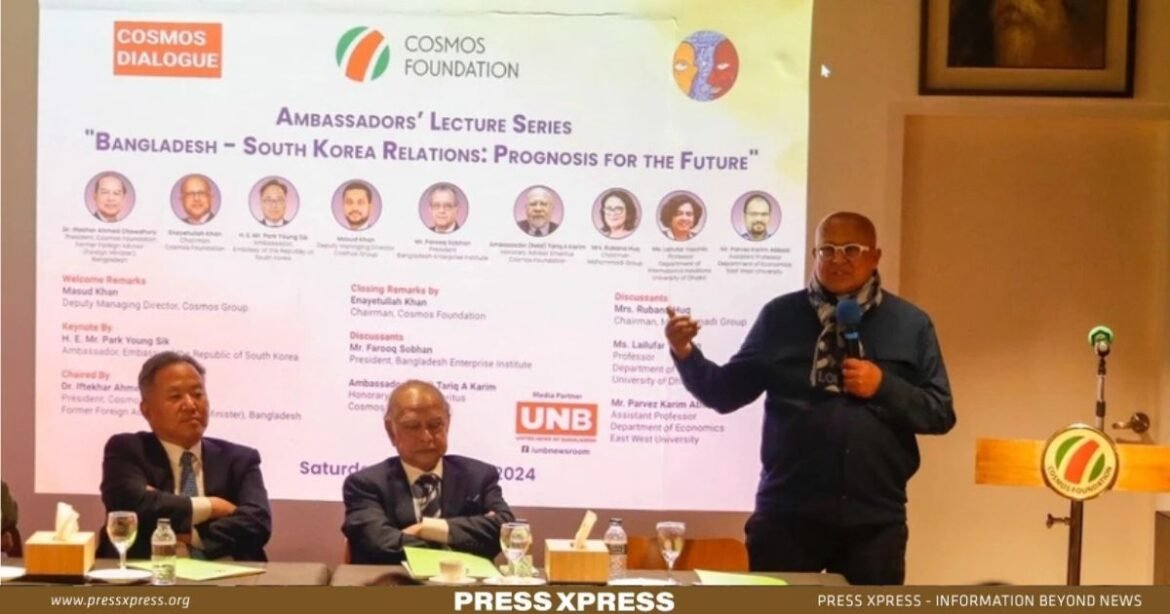Key highlights:
- Recent statistics show that bilateral trade between Bangladesh and Korea has surged past $3 billion
- KOICA’s recent initiative is the ‘Capacity Building of Statistics Services Based on Platform’ project
- Samsung, supports the development of renewable energy in Bangladesh, as it is a partner of the Korean EPZ (KEPZ), which operates the largest single rooftop solar power plant in the country, with a capacity of 22MW
- Under the initiative of ‘World Friends Korea’, Korean volunteers and doctors spend about 2 years in Bangladesh
Over the course of the last five decades, Bangladesh and the Republic of Korea have cultivated an amicable relationship, rooted in diplomacy and mutual understanding. The seeds of this enduring partnership were sown on December 18, 1973, when the two nations formally established diplomatic ties. Since then, their bond has flourished, evolving into a multifaceted collaboration that transcends geographical boundaries.
You can also read: Dhaka Applauds ICJ Ruling Against Genocide, Stands in Solidarity with South Africa
On 27 January, Saturday, the South Korean Ambassador to Bangladesh, Park Young-sik, delivered a keynote speech at Cosmos Dialogue, where he highlighted the potential for further development of the bilateral relations between the two countries.
In addition, the dialogue touched upon the present condition and forthcoming opportunities in economic partnership between Bangladesh and South Korea. Recent statistics show that bilateral trade has surged past $3 billion. The ambassador identified several new areas of bilateral cooperation, such as footwear and leather, ICT, pharmaceutical, shipbuilding and shipbreaking industry, Blue Economy and deep-sea fishing, agricultural and agricultural machinery, and greenhouse and carbon trading schemes.

How Bangladesh and South Korea Are Redefining Economic Collaboration
Young said that the two leaders- Sheikh Hasina and South Korean President Yoon Suk-yeol in New Delhi on September 9 on the sidelines of G20 vowed to further deepen cooperation in trade and commerce, culture and people to people contacts.
It’s noteworthy that in 2023, Korea and Bangladesh commemorated 50 years of their bilateral relationship showcasing South Korea’s pivotal role as a major economic partner, ranking as the 4th largest economy in Asia. Bangladesh has secured USD 1.3 billion in foreign direct investment from South Korea, setting its status as the 5th-largest recipient of FDI from the East Asian nation.
Bangladesh and South Korea have forged a strong economic partnership over the last four decades. What began as a focus on the textile and apparel industries in the early 1980s has now diversified into other areas, such as leather and leather products, consumer electronics, mobile phones, home appliances, automobiles, ICT, infrastructure, and more.
More than 200 Korean companies and agencies, including Samsung and The Korea International Cooperation Agency (KOICA), have established a significant presence in Bangladesh.
KOICA’s recent initiative is the ‘Capacity Building of Statistics Services Based on Platform’ project, for which Bangladesh and South Korea signed the Record of Discussion (RoD) and Terms of Reference (ToR) in 2023. The project, funded by a $9.65 million grant from KOICA, aims to enhance the quality and reliability of statistical data and services in Bangladesh.


Samsung has set up a manufacturing plant in Narsingdi. It also supports the development of renewable energy in Bangladesh, as it is a partner of the Korean EPZ (KEPZ), which operates the largest single rooftop solar power plant in the country, with a capacity of 22 MW.
Apart from investing in the Bangladeshi economy, South Korea also provides employment opportunities for Bangladeshi human resources, with approximately 25,000 expatriate workers and their families living there.
The economic ties between Bangladesh and South Korea have grown stronger over the years, as evidenced by the increase in bilateral trade volume. In 2023, the trade between the two countries crossed the $3 billion mark for the first time, which was a remarkable increase from $1.8 billion in 2011 and $2.3 billion in 2021.
According to the South Korea International Trade Association (SKITA), the bilateral trade volume rose by 38.71%, from $2.188 billion in 2022 to $3.035 billion in 2023. South Korea is now the third largest import source for Bangladesh, surpassing Japan, Singapore, and Hong Kong.
A Look at the Diverse Aid and Cultural Influence of Korea in Bangladesh
The Korean government has donated between $3 and 5 million every year to this humanitarian cause. The 3rd Committee resolution in the 72nd UNGA in November 2017, which addressed the human rights situation in Myanmar, was also backed by South Korea.
In addition to financial aid, South Korea has also contributed to the development of Bangladesh through voluntary service and training programs. Under the initiative of ‘World Friends Korea’, Korean volunteers and doctors spend about 2 years in Bangladesh, working on various sectors such as health, rural development, ICT development, and Korean language teaching.
Bangladesh, one of the most vulnerable countries to the impacts of global warming, has received a $90 million loan from South Korea for the “Climate Resilient Inclusive Development Programme”.
Cultural exchange is also a vital aspect of the friendship between Bangladesh and South Korea. The young generation in Bangladesh has embraced the K-pop, K-drama, and K-food cultures, creating a strong bond between the two nations. The Korean Cultural Center in Bangladesh plays a key role in promoting cultural cooperation, by organizing various events such as film festivals, art exhibitions, and performances throughout the year.

As two nations that share a common vision of peace and prosperity, Bangladesh and South Korea have forged a strong bond of friendship and cooperation. Their achievements in various fields, such as economic development, social welfare, and cultural diversity, are a source of inspiration for others who aspire to innovate and illuminate the world with the brilliance of partnership. Their story is not only a part of the symphony of nations, but also a vital thread in the needlepoint of tomorrow. They have shown resilience in overcoming challenges, respect in honoring their differences, and relentless pursuit of a brighter tomorrow for themselves and the world.
Furthermore, Bangladesh and the Republic of Korea have exhibited outstanding collaboration in various multilateral forums. Bangladesh staunchly supports the United Nations’ central and legitimate role in preserving worldwide peace, security, and development. Our commitment to global peace is demonstrated through our endorsement of the UNGA Resolution on the ‘Culture of Peace and Non-Violence.’ As a significant contributor of troops and police to UN peacekeeping endeavors, we reaffirm our dedication to fostering peace. South Korea’s robust commitment to international peace and security is evident in its active engagement in UN activities. Bangladesh remains steadfast in supporting global initiatives for the denuclearization of the Korean Peninsula.


